|
|
|
Sort Order |
|
|
|
Items / Page
|
|
|
|
|
|
|
| Srl | Item |
| 1 |
ID:
155783
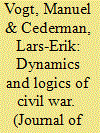

|
|
|
|
|
| Summary/Abstract |
This article reviews the literature on civil war. We focus on the most recent period of scholarly activity, beginning in the early 2000s when the publication of prominent quantitative studies triggered a surge in the empirical research of civil war as a well-defined conceptual category. We identify three explanatory logics that have dominated much of this literature and that view civil wars as a consequence of greed, grievances, and opportunities, respectively. We evaluate the arguments and findings of these theoretical approaches with respect to each of the main phases of war: outbreak, wartime dynamics, conflict termination, and postwar recovery. The article concludes by identifying key challenges confronting future civil war research. In particular, we emphasize the continuing need to advance theories that bridge the main explanatory logics as well as the different phases of conflict. Researchers should also pay more attention to defining the appropriate spatiotemporal scope of their studies.
|
|
|
|
|
|
|
|
|
|
|
|
|
|
|
|
| 2 |
ID:
158377
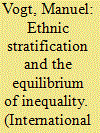

|
|
|
|
|
| Summary/Abstract |
Why are ethnic movements more likely to turn violent in some multiethnic countries than in others? Focusing on the long-term legacies of European overseas colonialism, I investigate the effect of distinct ethnic cleavage types on the consequences of ethnic group mobilization. The colonial settler states and other stratified multiethnic states are characterized by an equilibrium of inequality in which historically marginalized groups lack both the organizational strength and the opportunities for armed rebellion. In contrast, ethnic mobilization in the decolonized states and other segmented multiethnic societies is more likely to trigger violent conflict. I test these arguments in a global quantitative study from 1946 to 2009, using new data on the linguistic and religious segmentation of ethnic groups. The results confirm that the extremely unequal colonial settler states experience less violence than the decolonized states and other multiethnic countries. Ethnic conflict is generally more likely the more segmented and less hierarchically structured multiethnic states are. Specifically, stable between-group hierarchies reduce the risk of governmental conflict, whereas segmentation affects secessionist violence.
|
|
|
|
|
|
|
|
|
|
|
|
|
|
|
|
| 3 |
ID:
180669
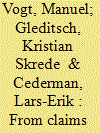

|
|
|
|
|
| Summary/Abstract |
Do radical political demands increase the risk of ethnic civil conflict? And why do ethnic movements make radical demands in the first place? We contend that when movements are fragmented, individual organizations use far-reaching claims relative to the status quo to attract attention from the government, boost intra-organizational discipline, and outbid rivals. Yet, such radical claims also increase the risk of conflict escalation. We test our arguments at both the ethnic group and organizational levels, using a new dataset on ethno-political organizations and their political demands. Our results show that the scope of demands increases the more organizations exist within an ethnic movement and that radical demands increase the risk of civil conflict onset. This effect is specific to the dyadic government-movement interaction, irrespective of other ethnic groups in the country. Moreover, at the organizational level, radicalization in demands increases the likelihood that an organization becomes engaged in civil conflict.
|
|
|
|
|
|
|
|
|
|
|
|
|
|
|
|
| 4 |
ID:
141710
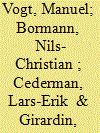

|
|
|
|
|
| Summary/Abstract |
This article introduces the new Family of Ethnic Power Relations (EPR) data sets, version 2014, which is the latest in a series of data sets on ethnicity that have stimulated civil war research in the past decade. The EPR Family provides data on ethnic groups’ access to state power, their settlement patterns, links to rebel organizations, transborder ethnic kin relations, and intraethnic cleavages. The new 2014 version does not only extend the data set’s temporal coverage from 2009 to 2013, but it also offers several new features, such as a new measure of regional autonomy that is independent of national-level executive power and a new data set component coding intraethnic identities and cleavages. Moreover, for the first time, detailed documentation of the EPR data is provided through the EPR Atlas. This article presents these novelties in detail and compares the EPR Family 2014 to the most relevant alternative data sets on ethnicity.
|
|
|
|
|
|
|
|
|
|
|
|
|
|
|
|
| 5 |
ID:
151286
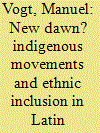

|
|
|
|
|
| Summary/Abstract |
This article investigates how indigenous movements in Latin America promote the political inclusion of historically marginalized indigenous groups. I argue that the social pressure produced by a strong movement promotes the inclusion of indigenous representatives in formal leadership positions. However, this effect depends on both the movement’s internal unity and the general responsiveness of the political system. I examine my claims using a mixed-methods design. I draw on a new group-level data set on ethnic parties and ethnic civil society organizations in Latin America between 1946 and 2009. My statistical analysis finds that indigenous groups with well-organized movements are more likely to achieve inclusion in executive positions of state power. The level of democratic freedom in a country greatly conditions this effect, while movement-internal factionalism undermines the political effectiveness of indigenous mobilization. I illuminate the causal mechanisms underlying these results in a case study of the rise and decline of indigenous mobilization in Ecuador.
|
|
|
|
|
|
|
|
|
|
|
|
|
|
|
|
|
|
|
|
|